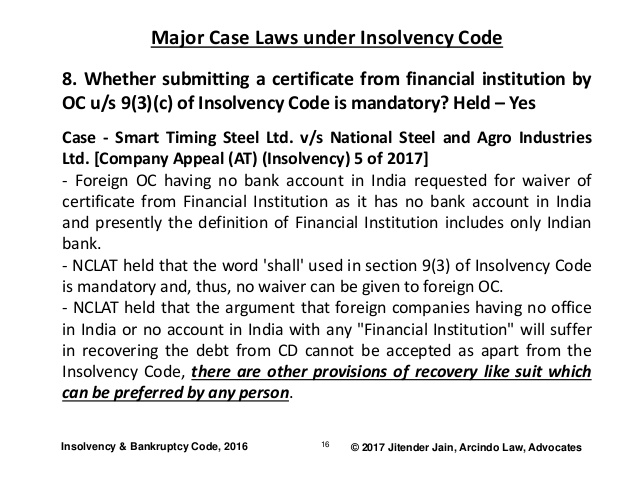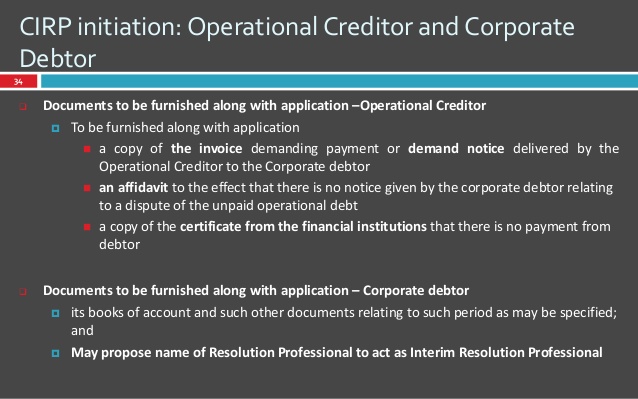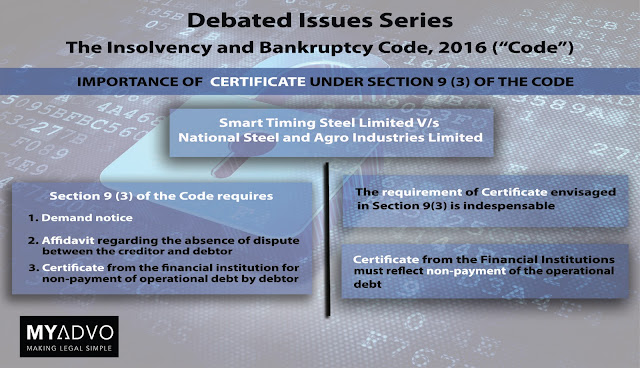A FOREIGN FINANCIAL or operational CREDITOR CANNOT INVOKE INSOLVENCY
PROCEDURE IN INDIA IF HE DOES NOT PRODUCE A NO-DUE CERTIFICATE FROM INDIAN
FINANCIAL INSTITUTION – A MAJOR HANDICAP TO BE PLUGGED INTO.
Smart Timing Steel Ltd.
versus National Steel and Agro Industries Ltd
FACTS OF THE
CASE
In this case, Smart Timing Steel Ltd. (“Appellant”),
being an Operational Creditor in this case, filed an application before the
Adjudicating Authority (Mumbai Bench) for initiation of corporate insolvency
resolution process under Section 9 of Insolvency & Bankruptcy Code (“Code”).
It is important to note that the Appellant did not submit the certificate
from the Financial Institution (maintaining its accounts) confirming that there
is no payment of the operational debt by the Corporate Debtor, along with
its petition, which is a mandatory requirement under Section 9 of the Code.
Later, when the
Appellant was given an opportunity to file the above certificate, it failed to
do so and submitted that it should be exempted from such compliance, as the
bank of the Appellant is situated outside India. The Appellant in this case had
no office or bank account in India with any of the scheduled banks, Financial
Institution (as defined under Section 45 of RBI Act, 1934), Public
Financial Institution (as defined under Section 2 (72) of the Companies Act,
2013) or with any other institution notified by Central Govt. as “
Financial Institution”. Consequently, the Appellant failed to enclose
such certificate from ‘Financial Institution’ maintaining its account.
DECISION OF
THE NCLAT , MUMBAI BENCH
The above petition of
the Appellant was rejected by the Adjudicating Authority on ground of
non-compliance with the provision of Section 9(3)(c) of the Code (i.e., non-filing
the above certificate). Aggrieved by the above order, the Appellant filed an
appeal before NCLAT under Section 61 of the Code).
DECISION OF
THE NCLAT
Referring to Section 9
of the Code, NCLAT observed that the entire provision of sub-clause (3) of
Section 9 is “required to be mandatorily followed and it is not empty
statutory formality”.
NCLAT was of the view
that the argument that foreign companies having no office in India or no
account in India with any Financial Institution will suffer in recovering the
debt from corporate debtor as it cannot be accepted as apart from the
Insolvency code, there are other provisions of recovery like suit which can be
preferred by any person.
Macquaire Bank
Limited V/s Uttam Galva Metallics Limited
In the above case also
, the same issue was raised . National Company Law Appellate Tribunal (NCLAT), Chandigarh, have
upheld the order of the Hon'ble NCLT Chandigarh wherein the Hon'ble Tribunal
had held that the "Certificate from a foreign Bank cannot be considered
as Certificate from financial institution as contemplated under Section 9 (3)
(c) of the I&B Code 2016."
However, the Supreme Court has over ruled the
NCLAT decision on 15th December, 2017 In the matter of Macquarie Bank Limited
Vs. Shilpi Cable Technologies Ltd. Civil Appeal no. 15135-2017 . Hence, Section 9(3)(c) is no longer mandatory but only directory in
nature.
The Supreme Court has over ruled the NCLAT decision
MY VIEWS
Indian Insolvency code
should not prescribe a procedure that cannot be satisfied or fulfilled against
foreign suppliers. Such provisions will be considered as ultra vires of UNCITRAL
Model Law on Cross-Border Insolvency (1997) to which Indian
government is a signatory or the provisions of free trade advocated by World Trade
Organisation to which Indian government is a signatory.
By making it mandatory the
certificate from an Indian financial institution , the foreign suppliers are put
at handicap. Declaring it as a mandatory provision for getting a certificate
from a Indian financial institution , it is submitted that it is against the
natural justice.
Instead , foreign
suppliers should be allowed to enclose the following along with their
application for initiation of insolvency under IBC Code 2016.
·
Copy of the contract entered between
Indian buyer and foreign supplier.
·
Copies of bill of lading and invoices.
· Copies
of the acknowledgement of receipt of goods
· Copy
of the notice served on Indian buyer demanding the payment.
· An affidavit by foreign supplier or his
power of attorney that no payment has been received from the Indian buyer.
This is a serious gap in the Insolvency and
Bankruptcy Code 2016 and this has to plugged immediately through suitable
amendment.



No comments:
Post a Comment